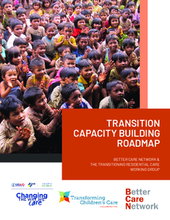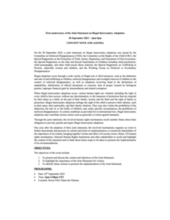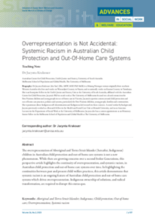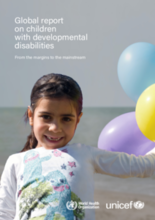Demographic Data
|
Sources: World Bank, UNICEF, UNDP HDR 2015, DHS 2013 |
Displaying 791 - 800 of 14551
The demand for social care, support, and protection is rapidly increasing across Europe, driven by a variety of factors, such as demographic changes and increasing inequalities. This briefing from the European Social Network (ESN) examines this critical issue and identifies solutions to manage demand for social services, to plan and allocate their resources, both human and financial, to deliver high-quality outcomes that are tailored to the actual needs of persons seeking support.
This document outlines a capacity-building roadmap for scaling up the transition of residential care services. It is an interagency resource developed by Better Care Network and the Transitioning Residential Care Working Group (Transforming Children's Care Collaborative).
This event taking place in Geneva at the Palais des Nations on 20 September between 3.00-4.50 pm CET is to celebrate the one year anniversary of the joint statement on illegal intercountry adoption issued by the Committee on Enforced Disappearances and the Committee on the Rights of the Child. The concept note and agenda for this event is attached.
This article highlights the continuity of overrepresentation of Aboriginal and Torres Strait Islander children, and systemic racism, in the Australian child protection and out-of-home care systems over time.
The 2023 SDG Summit will take place on 18-19 September 2023 in New York. It will mark the beginning of a new phase of accelerated progress towards the Sustainable Development Goals with high-level political guidance on transformative and accelerated actions leading up to 2030.
Supported by a grant from the Martin James Foundation, the Alliance will soon be implementing a new project to mobilise the experiences and knowledge of care-experienced youth, family me
In this article, the authors aim to analyse how the process of deinstitutionalization in Bulgaria relates to the concept of child’s rights articulated in the CRC on which it is based. They focus on children without disabilities, specifically children raised in small home centres (SHC2) subject to so-called residential care.
The article explores the notion of deinstitutionalization, emphasising its importance in post-conflict areas and emphasising the value of a personalised social work approach in promoting the welfare of children and young people impacted by the Russia-Ukraine war conflict.
This WHO-UNICEF Global Report on children with developmental disabilities provides principles and approaches to intentionally include the needs and aspirations of children and young people with developmental disabilities in policy, programming and public health monitoring.
Fifty years after coup that delivered Pinochet power, thousands still grieve the children stolen during his rule.







